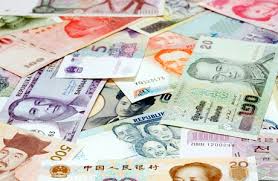By Yumi Teso - Aug 16, 2012 7:06 AM GMT+0400
 The Bloomberg-JPMorgan Asia Dollar Index snapped a four-day loss after state radio quoted Wen as saying yesterday that slowing inflation creates more room to adjust policies. China is the biggest export market for Thailand, Taiwan and South Korea and the second-largest forMalaysia. The Korean jobless rate fell to 3.1 percent in July, the lowest level this year, official data showed today, while Malaysia reported yesterday that growth unexpectedly accelerated in the second quarter.
The Bloomberg-JPMorgan Asia Dollar Index snapped a four-day loss after state radio quoted Wen as saying yesterday that slowing inflation creates more room to adjust policies. China is the biggest export market for Thailand, Taiwan and South Korea and the second-largest forMalaysia. The Korean jobless rate fell to 3.1 percent in July, the lowest level this year, official data showed today, while Malaysia reported yesterday that growth unexpectedly accelerated in the second quarter.
Asian currencies rallied after Chinese Premier Wen Jiabao said there’s room to adjust monetary policy in the world’s second-largest economy, improving the region’s export outlook.
“Monetary easing in China to spur growth is positive for Asia as it improves the export environment,” said Yuji Kameoka, chief currency strategist at Daiwa Securities Co. in Tokyo.
Taiwan’s dollar strengthened 0.1 percent to $NT29.974 as of 10:34 a.m. in Taipei, according to data compiled by Bloomberg. Malaysia’s ringgit gained 0.1 percent to 3.1318 and the Philippine peso rose 0.1 percent to 42.25. The Asia Dollar Index, which tracks the region’s 10 most active currencies excluding the yen, advanced 0.04 percent after losing 0.4 percent in the previous four days.
Malaysia, Thailand GDP
The ringgit rebounded from its lowest level in more than a week after central bank data yesterday showed gross domestic product increased 5.4 percent in the three months through June from a year earlier, beating all 23 estimates in a Bloomberg survey of economists. The median forecast was for growth to slow to 4.6 percent from 4.9 percent in the first quarter.
Expansion for the full year may be at the upper end of the projected 4 percent-to-5 percent range even as risks from Europe and the U.S. remain, Bank Negara Malaysia said.
“Demand for the ringgit is on the uptake because of the strong second-quarter GDP,” said Yeo Chin Tiong, head of financial markets at Alliance Bank Bhd. in Kuala Lumpur. “In the near term, the Malaysian currency should trade in a tight range in the absence of positive news.”
Thailand’s baht was little changed, after sliding the most in four weeks yesterday, ahead of data that is forecast to show a pickup in growth. The economy expanded 3 percent in the second quarter, compared with a 0.3 percent gain in the previous three months, according to the median estimate in a Bloomberg survey before an official report due Aug. 20. The currency traded at 31.54 per dollar.
“Solid economic data should help attract some fund inflows, especially as risk sentiment has been improving globally,” Daiwa Securities’ Kameoka said.
Weaker Yuan Fixing
China’s yuan dropped the most in almost two weeks as the central bank weakened the daily fixing to the lowest level since November. the exchange rate. The currency dropped 0.07 percent to 6.3669 per dollar in Shanghai. Premier Wen said there’s “growing room for monetary-policy operations,” during a two- day visit to the eastern province of Zhejiang.
“China will keep the yuan weaker to alleviate pressure on exporters,” said Daniel Chan, executive vice president at Glory Sky Global Markets Ltd. in Hong Kong. “There’s no surprise in what Wen said. More aggressive easing is just a matter of timing and investors are waiting for genuine actions.”
Elsewhere, Indonesia’s rupiah were little changed at 9,511 per dollar. South Korea’s won weakened 0.3 percent to 1,132.65 from Aug. 14. Korean financial markets were closed yesterday for a holiday. Vietnam’s dong strengthened 0.1 percent to 20,850.
To contact the reporter on this story: Yumi Teso in Bangkok at yteso1@bloomberg.net
To contact the editor responsible for this story: James Regan at jregan19@bloomberg.net